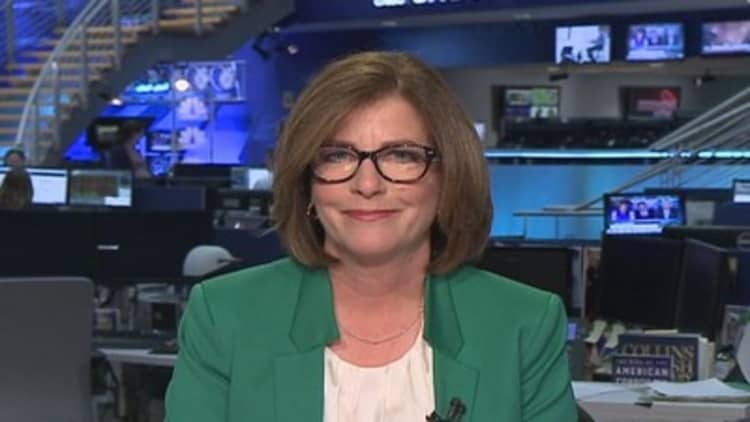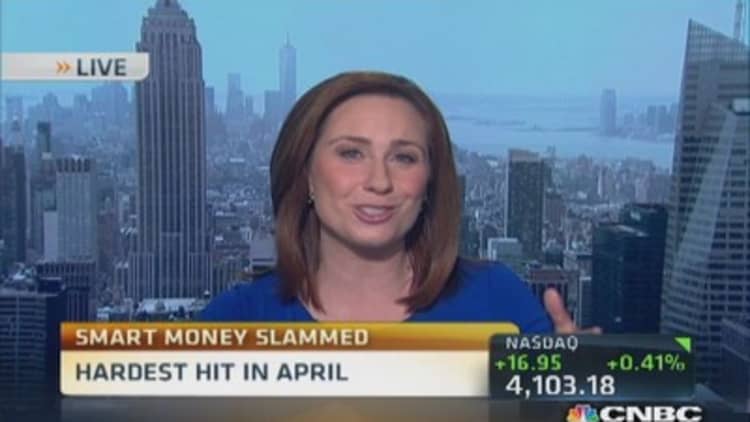For every headline-grabbing foray by billionaire investors Carl Icahn or William Ackman, there are dozens more so-called activist investors the public never hears about. And this army of agitators is growing rapidly—and has a bulging arsenal of cash.
When activist investors show up in a stock, they often make headlines. Assets get sold, or in the high-profile case of Apple—there was a stock split, dividend hike and increased buyback.
But most of the time, they don't make headlines, and by some estimates, only about a third of the companies that are approached by activists ever make the overtures public.
In fact, some of the biggest companies in corporate America have been quietly approached or will be approached by activist investors, whose ranks and pocketbooks are growing as money funnels into the asset class. The ranks of investment bankers and advisors that just focus on activist activity are also growing.
A stunning $3.5 billion in net assets flowed into activist hedge funds in the first quarter alone—compared with a net $5.3 billion for all of last year, according to Hedge Fund Research. Total assets under management in those funds rose to $100.5 billion.
The number of advances is also increasing. There were 369 companies targeted by 463 investors in 2013, up from 329 companies the year earlier, according to Hedge Fund Solutions. Those are only the documented situations, made public through filings or releases.
"One of the interesting things, when it comes to activity is several years ago a company would generally just resist," said Scott Bok, CEO of Greenhill. "That was kind of the general knee-jerk reaction. That is not the knee-jerk reaction today. In a surprising number of ways, companies are quick to acknowledge the approach, have a willingness to hold discussions and put the activist on their board very quickly."
"It's been an interesting evolution here. I think if you go back to 2005, 2006 or 2007, when an activist got involved, it was unusual to push for the sale of the company. If you look at the last few years, it was usually to get a company to buy back stock," Bok said. "It does feel like the activists have now shifted toward more strategic M and A."
Besides the growth in capital, the number of activists are growing and many of them are not household names.
"There's certainly a lot of new entrants. A lot of new investors that have sprung out of the activist shops over the last couple of years. They're raising significant capital, and they're going to have to deploy," said Damien Park, managing partner at Hedge Fund Solutions. "What I'm hearing out there right now is good value opportunities are limited... so I think what we'll see is these activists that are all raising capital will club together and go after bigger fish."
Activism took a new twist last month when hedge fund manager William Ackman teamed up with Valeant Pharmaceuticals to make a huge, hostile $48 billion bid for Allergan, the maker of Botox. Some experts expect to see more of these deals and activist Carl Icahn even praised the action.
That comment marked a change in the high-profile feud between Icahn and Ackman who took opposite positions on the Herbalife controversy and aired their differences in a contentious debate on CNBC.
Allergan, meanwhile, says it's reviewing the bid, and Valeant officials Wednesday said they have been speaking with Allergan shareholders and plan to push for changes on the Allergan board.
Valeant and Ackman's Pershing Square also plan to seek a referendum of Allergan shareholders to support talks with Valeant. Pershing owns almost 10 percent of Allergan.

"It's not new for an investor to team up with an established company to make an offer, but I think this sets the precedent here for large companies to do it," said Park, who represents both companies and activist investors.
Among his clients is the investor group in Novatel Wireless that succeeded last week in getting two directors on the board and the separation of the CEO and chairman roles, with the appointment of an independent chairman.
In fact, activist activities may be behind what had been a slower atmosphere for corporate mergers in the last couple of years. In recent weeks, the merger market has become much more active with bigger deals between corporations seeking strategic partners or assets, putting this year on track to be the busiest since 2007.
One merger advisor said he had seen an inward focus on the part of corporate managers, who bought back stock or spent more time cleaning up businesses because they didn't want to be seen "boldly stepping out" with a big deal that could draw the ire of activist investors. But acquiring companies are no longer automatically seeing their stocks bruised, and managements are being rewarded with rising stock prices if their acquisition is viewed as good for growth.
Whether activism is good or bad will always be debated, but on a whole the view on Wall Street is that it has helped companies stay on their toes and helped the stock market more than hurt it.
"I think some aspects of activism have gone too far, and in some cases activism does breed corporate efficiency because corporations are made more vigilant than usual in anticipation of it. You can't say activism is good or activism is bad," said Evercore founder Roger Altman. "You've seen some companies where there's been some form of entrenchment and the activist shakes it up and it's better."
Citigroup's chief U.S. equity strategist Tobias Levkovich said activists are one reason why large cap stocks are so appealing now. They are also an area where values are better.
"This isn't the green mail days of the 1980s. Does every activist do the right thing? No," said Levkovich. "In a truly democratized market, there should be nothing wrong with an activist."
Managements have also become more proactive when it comes to activists, moving ahead with shareholder enriching actions even before they are approached.
"I think boards are much more focused than they have been. They know they're accountable and activists are trying to replace boards that aren't doing the right thing in maximizing shareholder value," said Cliff Noreen, president of Babson Capital. "The bonds do get harmed sometimes because of this. There's been more shareholder friendly actions."
Noreen also believes the improvement in management focus has been a positive for corporate earnings, and earnings per share have also improved because of the many share buybacks, shrinking outstanding shares.
Jason Truman, an investment banker at Morgan Stanley, has been focused on representing companies in their dealings with activists for the past two years. He said there are several key criteria that show whether a company is vulnerable.
"Probably the most important is performance relative to peers over the last year. The second is the idea that they are sitting on cash or have an underleveraged balance sheet. The third is their multiples are undervalued relative to peers and the fourth is they have divisions that are kind of disparate or they have underperforming assets," he said.
Truman said engaging the activist immediately is key, "meet with them to death."
"Any good CEO, he or she is always focused on driving long-term value. The reason people worry is they think the activists will come in and focus on the short term," he said. "(Activists) have a big megaphone. All the big shareholders out there, whether it's BlackRock or Fidelity, are willing to listen, not partner with them, but listen, and whether it's a good idea or not, it's going to get a lot of attention."
Activist activities are expanding with funding, but also there have been changes that have made it easier for investors to exact change. "There's been a general breakdown of defenses in corporate America—getting rid of staggered boards, getting rid of poison pills, letting shareholders act through written consent. There are things that are allowing activists to get involved in companies all year round rather than just in proxy season," he said.
But even so, much of the activity doesn't come to public attention and that's intentional.
"When we talk to clients about activism and we talk to the people in this cottage industry that popped up here, we usually tell people that about two-thirds of the stuff we do at Morgan Stanley never sees the front page of the big publications out there, and the reason is because…it's in everyone's interest.
The activists don't want to go public. That's not what they're trying to do. It just needs to go that route occasionally," Truman said. "If you look at the share repurchase activity that's gone on over the last two or three years, and you look at the number of divestitures, a lot of that is attributable to stuff behind the scenes."
Altman said he's engaged in plenty of activist situations that resulted in deliberations that never became public. "If an activist sends a private letter to a CEO…that's not required to be made public by SEC laws," Altman said. "Activists come in all shapes and sizes. Some are powerful and have a track record. It's pretty hard to define."
Greenlight Capital's David Einhorn showed up at Apple's door before Icahn came on the scene. Greenlight filed suit against Apple more than a year ago, demanding a bigger piece of its cash pile be paid out to shareholders, and Apple did boost its dividend and share buyback program last spring.
Icahn showed up with a large stake in Apple in August and said the stock could be worth as much as $700 if CEO Tim Cook pushed for a larger buyback. Icahn in February dropped his proposal to force Apple to add another $50 billion to its buyback plan after Institutional Shareholder Services recommended shareholders vote against it.
But Apple delivered anyway, announcing another $30 billion in share buybacks, a rare 7-for-1 stock split and an 8 percent dividend hike when it reported earnings in April.

Icahn, now in his late 70s, is one of the longest running activist shareholders and had been among the ranks of so-called corporate raiders in the 1980s, waging contentious battles against companies like U.S. Steel and Texaco. His arsenal now includes tweeting his opinions, and he tweeted that he was pleased with the buyback and earnings.
Apple's earnings per share also show the effects of the buyback. According to S&P/Capital IQ analyst Howard Silverblatt, Apple set a quarterly stock buyback record of $18 billion, and its earnings per share growth was 15.2 percent while its income grew less than half of that, at 7.1 percent. Apple reduced its quarter share count by 3.4 percent.
Some activists leave quickly and others stay for the duration. Icahn, appearing on CNBC this week, said he might consider committing to holding onto a stock, like Apple, for a year, and that he would announce it on Twitter.
Some activists become active players in companies whose shares they own.
Joe Sullivan is the CEO of Legg Mason and works beside activist investor Nelson Peltz who is on his company's board and supported his nomination last year. "I can only describe my relationship with Nelson. I have no interaction with other activists. The key word is constructive," he said. "My approach as CEO with Nelson has been to be transparent and straight forward and to leverage his experience and his thoughts and his team's experience and thoughts and capabilities as we think through things."
"He's demonstrated that he's not short-term oriented, that he thinks about the long-term value for shareholders," Sullivan said.
"My experience with Nelson and with Trian is they don't become dogmatically entrenched on anything other than doing what's best and making money for shareholders. We really have what I would call a constructive relationship with Trian," he said.
—By CNBC's Patti Domm.


